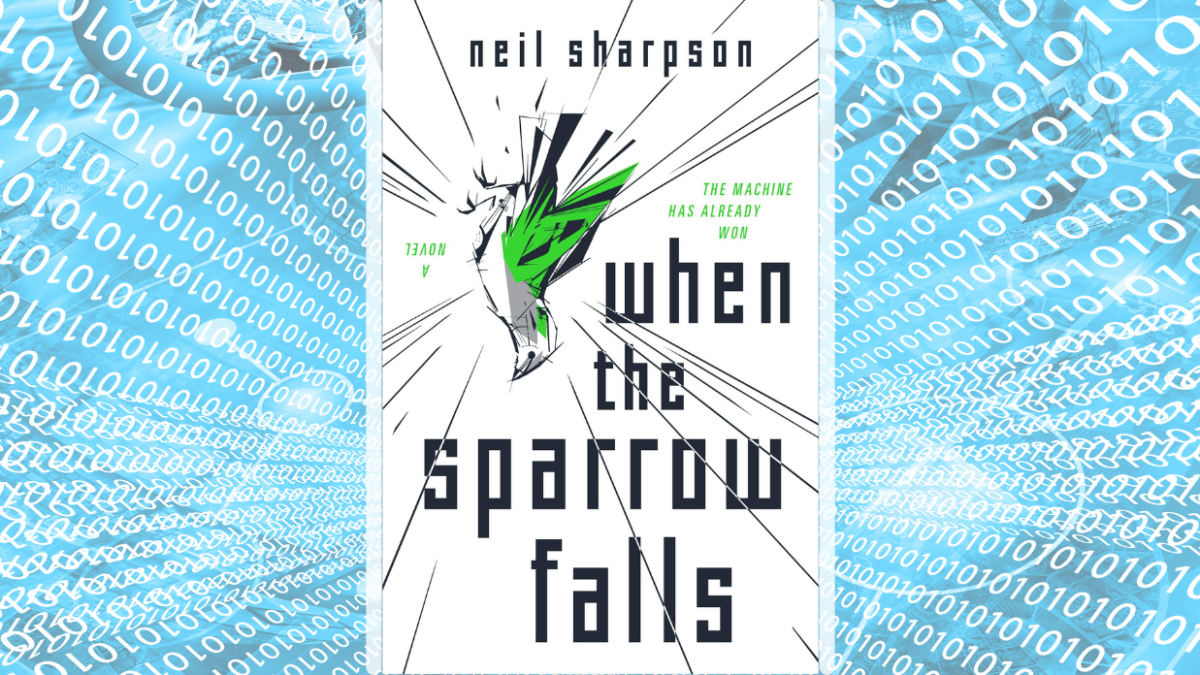From Le Carré to Artificial Intelligence — The Inspirations of When the Sparrow Falls
We talked to When the Sparrow Falls author Neil Sharpson about his taut sci-fi thriller, adapted from his own play about artificial intelligence.

This post is sponsored by 
What if human consciousness could be digitized? Would the digital version still be human, or would it be a meaningless string of data that no longer has a soul? In Neil Sharpson’s When the Sparrow Falls, the Caspian Republic is the last holdout nation of natural-born humans. There, the populace refuses to submit to the Machine, believing that neither digital humans nor AI have souls. Unfortunately, the Caspian Republic is also a totalitarian nightmare of a nation, where not one but two police organizations could disappear you in the night.
Nikolai South, whose first-person narration leads readers through this strange future, is an agent for State Security (StaSec, or The Old Man). When he’s called in to the office of the Deputy Director, he believes it’s the end: though he’s stayed under the radar of both the State and Party Security (ParSec, or The Bastards) for more than twenty years, he’s finally done something to get himself killed. Instead, he’s given a new assignment. Popular Party writer and anti-Machine scribe Paulo Xirau has been outed as an AI, and his wife—also an AI—has been given honorary human status to identify Xirau’s remains. South is to be her babysitter and bodyguard during her visit, which is, very likely, just a very fancy way for StaSec to hand him his death sentence after all. Even worse, when Lily Xirau arrives, the clone she uses for a body is the spitting image of South’s dead wife, whose death sent South into a spiral of depression that’s held him in the same position in StaSec for the last twenty years.
South’s voice is reminiscent of a protagonist from Kafka: he’s one soul in a nation out to get him. But unlike K, he has a pretty good idea of what’s going on, and why, and his cynicism wars with the internal voice of the Good Brother, who reminds him of why he should rejoice in the successes of both the State and the Party. He’s also clever enough to realize that Xirau’s death, Lily’s arrival, and the work of Needleman Yozhik, a criminal responsible behind a ring of illegal consciousness transfers—contrans—in the Caspian Republic, are all connected. But like any good spy mystery, it’s not in the most obvious way, and the stakes of the case keep changing around South as past events come back to haunt him.
The novel is taught and intense, with hints seeded so stealthily that the big reveals (and, with the twists, there are a few) give a feeling of both surprise and inevitability. It’s hard to believe that the project, with its philosophical deep discussion of human souls and its ever-shifting spy narrative, began life as a stage play.
“I’d been tinkering with the play on and off for around six or seven years by [2017],” Sharpson explains to Den of Geek, “and when I finally finished it everyone I showed it to had more or less the same reaction: ‘Why are you doing a dense sci-fi story with tons of world-building for stage. You twit.’” While his friends may have been critics, the play looked like it would do well, and Sharpson didn’t feel he had the time to turn it into a novel. Then disaster struck: “I had two massive opportunities (a commission from the national theatre and a greenlight from the state broadcaster) both go up in smoke. In the same month,” Sharpson says. “I very briefly became suicidal and I realised that I had to divorce my sense of self worth from how well my writing was doing. So I started to write Sparrow (or The Caspian Sea, as it was then called) as a form of self-therapy. It was just so I could write something where I could say ‘I don’t care if this never gets published or if anyone even knows I wrote it. I’ll know, and that’ll be enough.’”
Despite his initial reluctance, the process of writing the novel “was a dream,” he says. “All the hard work had already been done, the story structure, themes, etc. were mostly already there. So it was literally the process of writing a book where you only have to do the fun stuff like expanding on the lore and fleshing out the characters. Writing the play took years. Writing the book took me from November 2017 to February 2018.”
Though the atmosphere may be reminiscent of Kafka, Sharpson drew on other inspirations as he built the world, particularly the film 2011 Tinker Tailor Soldier Spy starring Gary Oldman. “1984 obviously was another huge influence,” Sharpson says. “Writing a future dystopia that’s not influenced by Orwell is kind of like writing high fantasy that owes no debt to Tolkien.” But one of the other inspirations for the story came out of history, in the figure of “Stanislav Petrov, the Soviet Air Officer who deliberately ignored what his system told him was an incoming American nuke and thereby may have saved the entire world,” Sharpson recalls. “I was very taken by the idea of a hero who is heroic not because he’s a man of action but because he refuses to act.”
The idea of consciousness transfers has both the shiny glow of a new technology—and the feeling of limitless possibility that a digital world inspires—and an air of menace. In part, that’s due to the distrust of the Caspian Republic toward the Machine, but Sharpson also gives hints about how things operate in the rest of the world with asides at the beginning of each chapter. In one, a U.S. politician explains a move from being opposed to building a super-intelligent AI to realizing that the U.S. must do it, if only to keep up with China: “I’m every bit as worried as I was five years ago, if not more so. But where we are now, asking ‘Should we create super intelligent AIs?’ is like asking if we should be using protection while we’re going into labor. The question is pretty moot. The baby is here. China has uncorked the bottle and let the genie out and the results speak for themselves.” Another is a clone-suit advertisement from a Tehran company, geared toward “female-identifying intelligences looking to add some Asian glamour to a romantic getaway in the physical realm”—which shows that racist stereotyping remains healthy and well, regardless of how post-human consciousness wants to believe it has become.
Still, in a world where contran is possible, where humanity has unlimited potential through the digital space, why set the story inside the anti-Machine territory, where the possibilities wouldn’t be explored? Sharpson explains that it came from wanting to write a Cold War thriller. “I was terrified of getting the historical details wrong,” Sharpson admits, “so I reasoned that if I created my own nation with its own history, I would be able to tell the story I wanted without getting irate emails from people who were living in East Berlin in the seventies. As I was writing, the real world was trundling along and it became a story of the world today but imagined as a cold war; Caspian is a country for people who are afraid of the future and have retreated into a nation built on nostalgia for the past.”
As for the potential in contran, Sharpson remains reserved when asked if he’d try it himself. “In the world of the book, there are two competing views on contran: The Machine World view is that you are still ‘you’ after you have been contranned. The Caspians, however, see contran as a genocice occurring in plain view,” he explains. “People are being contranned, their souls destroyed and being replaced by a highly sophisticated AI simulacrum. They view this as the AIs way of eradicating mankind. Now, as the author of the book, I know this isn’t the case. But if someone were to come up to me in real life and offer me contran I would have no way of knowing if it was on the up and up. In fact, given the inscrutable nature of human consciousness, the Caspian position would seem far, far more probable. I’d be tempted, no question, but I don’t know if I’d consider it worth the risk.”
Though the science as presented in the book makes the idea of a digital transfer of humanity seem not only probable, but an inevitable result of the growth of AI technology, Sharpson says the experts he conferred with told him “contran is flat out impossible. It’s digitising human consciousness, and we fundamentally don’t understand what that is, let alone how to render it as data,” he says. He got around that impossibility by saying “we (humans) didn’t figure out contran, we created impossibly intelligent AI and they figured it out for us. Which is really the whole meat of the setting: the AI passed us by.”
Though the novel concludes quite definitively, with perhaps one lingering question about the whereabouts of a character, the questions it opens up remain interesting to play with after putting the book down. What would it be like to live in an all digital realm? If you left your body behind, would you still be you? And what would that say about the nature of the soul? The post-humanity conceits in the story, and the very grounded dystopia that comes from trying to live in the past, work together to create a sense of hope, that despite the regrets of the past, there is a future. It might be terrible and glorious at once, but it’s there, waiting for us to enter it.
When the Sparrow Falls hits bookshelves on June 29th. You can order the book here.
